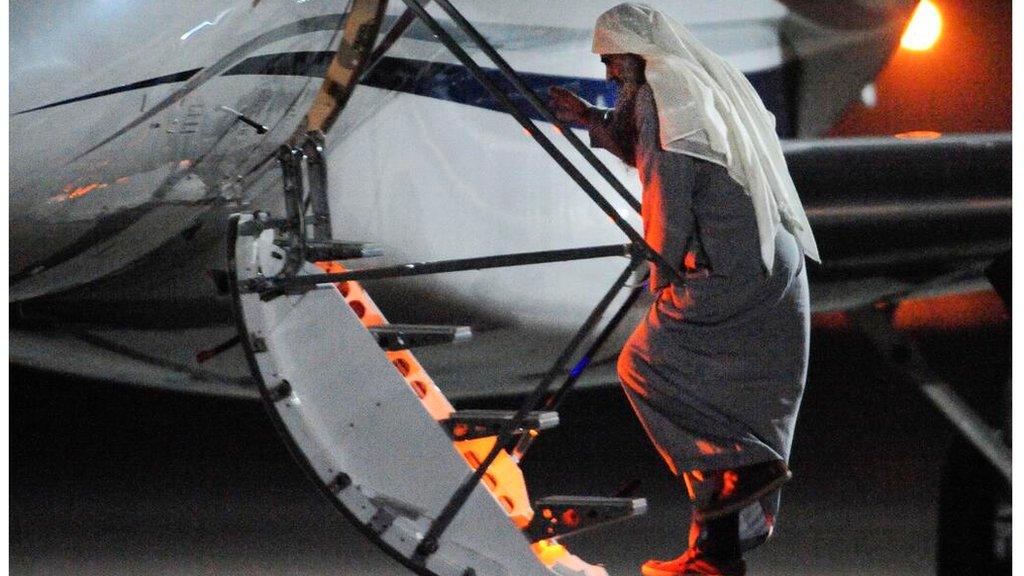Abu Qatada cleared of terror charges
- Published
The BBC's June Kelly says the court erupted as the verdict was delivered
Radical Muslim cleric Abu Qatada has been released from prison after being found not guilty of terrorism offences by a court in Amman, Jordan.
Judges said there was "insufficient evidence" to convict him of planning a thwarted terrorist plot against tourists and diplomats during Jordan's Millennium celebrations.
He was deported from the UK in 2013.
Britain's Home Office said he was "not coming back to the UK" as its courts agreed he was a threat to security.
Ministers in the UK fought a long legal battle to force the 53-year-old scholar to face trial in his home country.
Abu Qatada was accused of providing spiritual support through his writings to men alleged to have planned a series of atrocities aimed at Western and Israeli targets in Jordan on Millennium Eve.
Prosecutors said that books by Abu Qatada were found in raids on homes leading up to the New Year. Jordanian and American investigators accused him of supplying funds to the plotters.
He denied the allegations in a trial which punctuated by a number of outbursts by him.
His supporters erupted in applause when the verdict was read out in court.
UK Home Secretary Theresa May: "He will not be returning to the UK"
Speaking after the verdict, Home Secretary Theresa May, who headed UK government efforts to remove Abu Qatada, said: "The due process of law has taken place in Jordan. That is absolutely as it should be.
"The UK courts here were very clear that Abu Qatada poses a threat to our national security. That's why we were pleased as a government to remove him from the UK.
"He is subject to a deportation order, he is also subject to a UN travel ban. That means he will not be returning to the UK."

In court
Steve Swann, BBC News correspondent
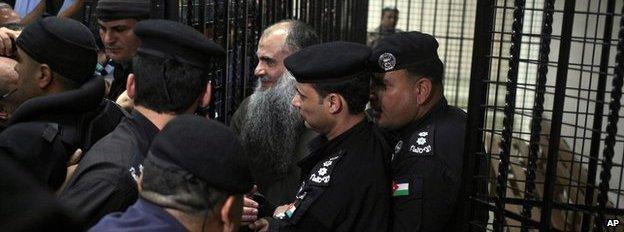
Flanked by armed guards Abu Qatada sat inside an iron cage nervously awaiting a verdict he has waited years to hear. When it finally came the courtroom erupted into chaos.
Some of his family cheered, others wept with relief. Wearing brown overalls the radical cleric kissed his lawyer through the bars and smiled.
His son said the family had always been optimistic about the verdict.
Reading from a prepared judgment, the panel of civilian judges had ruled there was insufficient evidence to convict the defendant who was first incarcerated in Britain in 2002.
It will come as a blow to ministers and officials in Whitehall but they made it immediately clear that he will not be coming back to London.
The question now is what he will have to say about the crisis that is engulfing Jordan's neighbours. He has already denounced Islamic State and their kidnapping and killing of Westerners. But he remains a supporter of al-Qaeda and has condemned the recent air strikes.
The man described by a British High Court as a "truly dangerous individual" is not expected to be silent on these issues.

'Truly dangerous'
Rafid Jaboori, BBC News correspondent in Amman, said it would be "interesting" to see how he resumed his life in Jordan and how much freedom authorities gave him.
Abu Qatada's family members were "very happy" to hear the verdict, he added.
The radical cleric, whose real name is Omar Othman, was granted asylum in the UK in 1994 but the security service MI5 increasingly saw him as a national security threat.
More than a decade ago the cleric issued rulings justifying suicide bombings. By 2005 the Home Office said he was giving religious legitimacy to those "who wish to further the aims of extreme Islamism and to engage in terrorist attacks".
Who is Abu Qatada? In 90 seconds
While he was in the UK, Abu Qatada had been convicted in Jordan of conspiring in the two Jordanian plots.
However the convictions of his alleged co-conspirators were eventually overturned because they had been based on evidence which may have been acquired by torture.
Under the Jordanian legal system, the preacher had been told he would be retried if he ever returned to the country.
Decade-long 'prevarication'
A treaty signed last year by Jordan and the UK banned the use of such evidence from trials in Jordan involving British deportees.
That removed the final obstacle to deporting the man described by British judges as a "truly dangerous individual... at the centre in the United Kingdom of terrorist activities associated with al-Qaeda".
The acquittal comes after Abu Qatada was cleared at an earlier trial in June of involvement in a 1998 bombing campaign.
David Blunkett, who was Home Secretary when Abu Qatada was detained in 2002, said the length of time it took to deport him was always going to make it more difficult to secure a conviction: "Abu Qatada's managed to do what he wanted to do, which was to prevaricate for 10 years.
"By doing that he's made it very much more difficult for the prosecution. However, it also proves that he was wrong, because the case he made against extradition was that he wouldn't receive a fair trial in Jordan and he clearly has."

Abu Qatada timeline
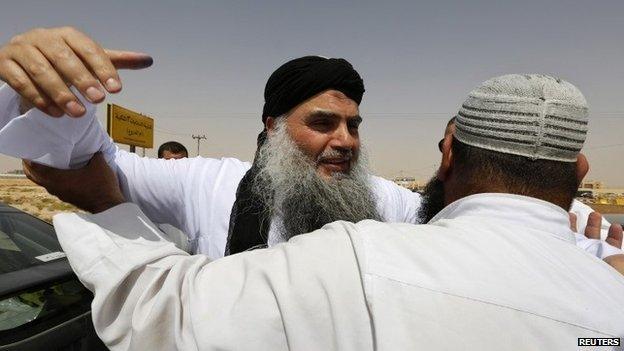
Abu Qatada was greeted by family members after being released from prison
September 1993: Claims asylum on his arrival in Britain on a forged passport and a year later is allowed to stay
April 1999: Convicted in his absence on terror charges in Jordan and sentenced to life imprisonment
October 2002: Detained at Belmarsh high-security prison following a law allowing authorities to hold foreign terrorism suspects without charge or trial
March 2005: Law Lords ban detention without charge, ordering release. He is initially issued with a control order, but subsequently detained again
April 2008: Court of Appeal rules deporting Abu Qatada will breach his human rights, because evidence to be used against him in Jordan may have been obtained through torture
February 2009: Law Lords back deportation, saying the Court of Appeal got it wrong
January 2012: European Court of Human Rights overturns that decision, saying he cannot be deported while "there remains real risk that evidence obtained by torture will be used against him"
April 2013: UK government signs a treaty with Jordan, complete with guarantees on fair trials, to ensure Abu Qatada can be deported - which he is later that year
June 2014: Civilian court in Jordan clears Abu Qatada of involvement in a 1998 bombing campaign
September 2014: Civilian court in Jordan clears Abu Qatada of planning a thwarted terrorist plot in 2000

Dr Usama Hasan at the Quillam Foundation told BBC News that Abu Qatada could be used against Islamic State (IS) by the Jordanian government. "But he is certainly no friend of the Jordanian government," he added.
Writings have recently appeared online in the radical cleric's name - seemingly smuggled out from his prison cell - which denounced IS militants. In one letter, the author calls the leaders of IS "the dogs of hellfire".
Earlier this month Abu Qatada condemned the murder of two Western journalists, saying reporters were "messengers of the truth" and that killing them contradicted Islamic teachings.
- Published26 June 2014
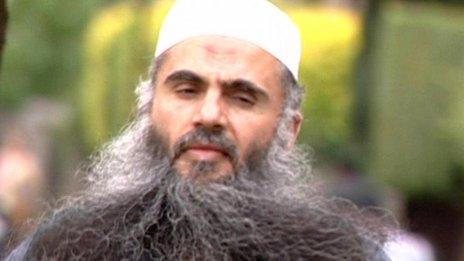
- Published24 September 2014
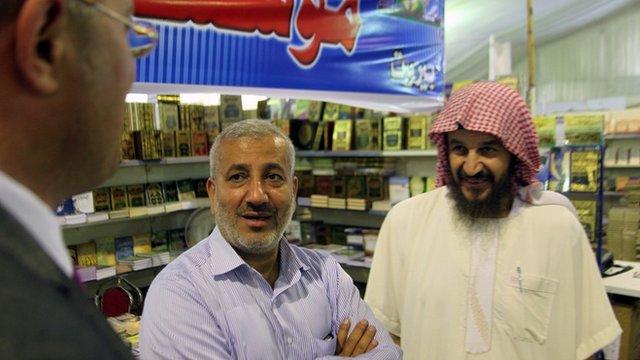
- Published7 September 2014
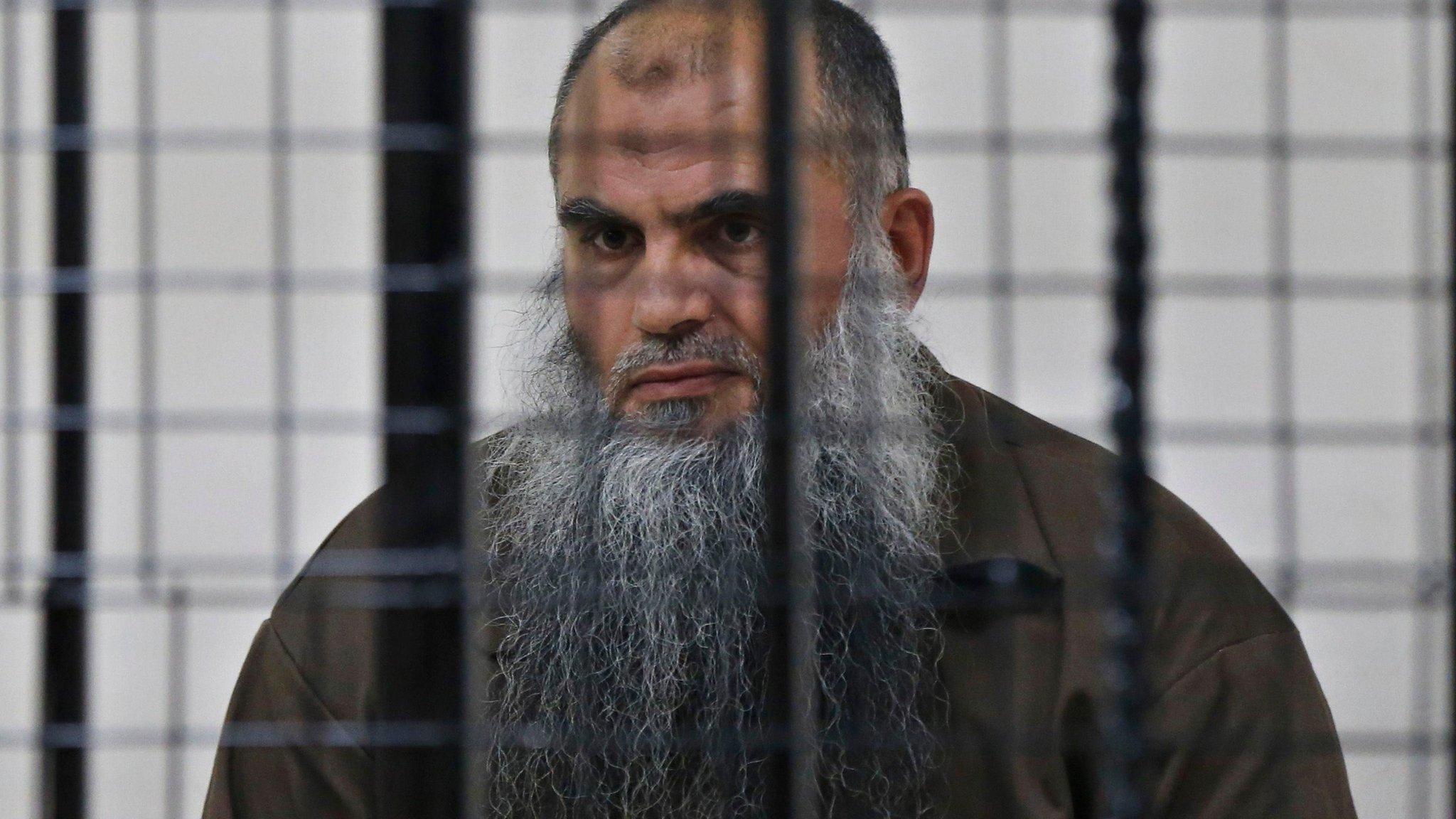
- Published26 June 2014
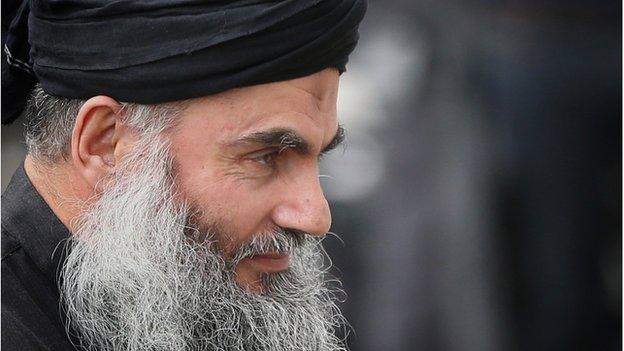
- Published7 July 2013
